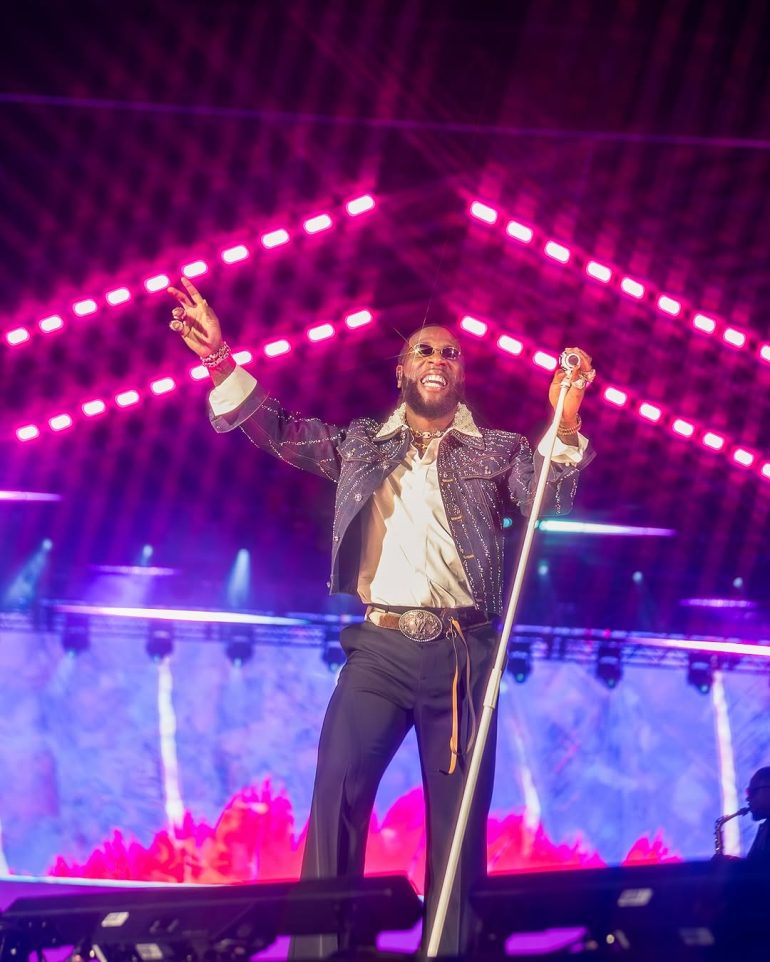On the evening of 18 April 2025, the concrete ribs of the Stade de France turned supple, pulsing like a living drum. Damini “Burna Boy” Ogulu had just become the first African—and crucially, the first non‑French‑speaking African—artist to headline and sell out the nation’s biggest stadium, drawing roughly 80,700 fans into a single breath.
The Prologue: Red Threads and Ancestral Echoes
History announced itself before Burna struck a note. Youssou N’Dour rose from a stage trapdoor in crimson, easing into “7 Seconds.” Eighty‑thousand voices found the chorus faster than memory should allow, as though the Senegalese legend were guiding everyone through a pan‑African roll call.
Moments later, Burna bounded out in a Louis Vuitton moto‑jacket, flashing the grin that has turned Paris Fashion Week runways into auxiliary concert venues. His first words—“Paris, je t’aime! From the bottom of my heart.”—crackled through the PA, a vow and a victory lap in one breath.
A Set‑list that Refused to Stand Still
Across two kinetic hours Burna treated his catalogue like wet clay, stretching tempos, splicing choruses, trusting The Outsiders Band to pivot from high‑life guitar filigrees to hip‑hop drum breaks. Anchor songs arrived early—“Tested, Approved & Trusted,” “On the Low,” “Talibans II”—each restyled with horn salvos or talking‑drum flourishes that made studio versions feel like sketches.
Midway through, the surprises blossomed:
- Dave skated in for the still‑irresistible “Location.”
- Haitian‑French crooner Joé Dwèt Filé melted linguistics on “4 Kampé II.”
- Street‑rap phenom Werenoi popped up for a too‑brief “Laboratoire,” the night’s lone pacing wobble.
- Back in Afrobeats territory, Shallipopi and Burna detonated the live debut of the “Laho” remix, throttle wide open.
Each cameo felt curated less for clout than for geography: Port Harcourt to Paris by way of Dakar, London, Port‑au‑Prince, and Évry‑Courcouronnes. The crowd followed every accent shift without missing a step; Afrofusion, it seems, carries its own simultaneous translator.
Anatomy of a Moment
Look around: a sea of Bluetooth‑synced wristbands glowing kente‑orange during “City Boys,” then flipping to deep indigo when the opening guitar of “Ye” twanged through the night air. Fireworks crowned “Last Last,” but the more disarming flare was internal—the slow‑motion realization that Nigerian pop had outgrown the “global‑next‑big‑thing” tag and simply is global pop now.
Between songs Burna spoke less than usual, yet every aside carried intent. He thanked the Paris crowd for “proving the dream wasn’t delusion,” nodded to his late mentor Virgil Abloh on the LED towers, and introduced Sister Nissi’s opening set as “family business taken worldwide.”
Why This Night Matters
In 2019, Burna cautioned skeptics that Afrofusion would “crash the gate.” Six years, a Grammy, and a London Stadium sell‑out later, the Stade de France felt less like a broken barrier and more like a re‑drawn map: Lagos on the Seine. French media struggled for superlatives—“embrasé”, “on est sous le choc”—while Nigerian outlets tallied the head‑count with pride.
For Nigerian pop, often scrutinized for shaky live standards, this was a dissertation in stagecraft: full live band, on‑the‑beat choreography, zero backing‑track lip‑sync. The same metrics fans once weaponized against their faves became the gauge of triumph.
Epilogue: A Path Lit for Others
As the crowd funneled toward the RER platforms—still humming “It’s Plenty” like an antidote to midnight chill—the significance settled in: a seat‑less stadium had become a wide‑open door. Wizkid touches Paris’ Accor Arena next month; Ayra Starr measures an arena tour for 2026. None will need to explain why live fidelity matters. Burna just supplied the textbook.
Walking out under the halo of the stadium’s floodlights, I remembered an older Lagos club owner telling me, “One day these songs will be too big for our rooms, but not for our hearts.” In Saint‑Denis, the hearts proved bigger than the room—80,000 of them, beating as one, bright enough to paint the night orange.


